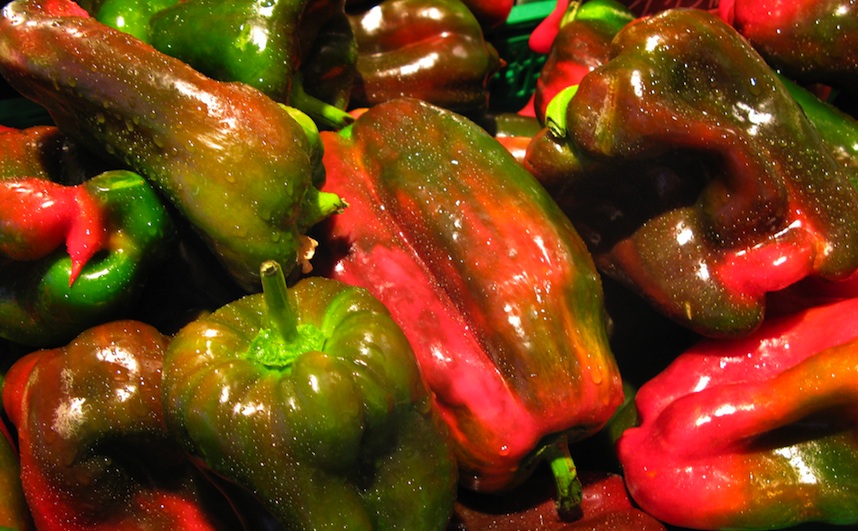Peppers ‘help prevent Parkinson’s’
Edible nicotine in peppers, tomatoes and potatoes may protect against Parkinson’s disease, a study suggests.
The research adds to evidence associating a reduced risk of the disease with smoking.
Peppers appeared to have the biggest effect. People who ate the vegetables twice a week or more were found to be 30% less likely to develop Parkinson’s.
However, experts urged caution since a number of factors including the disease itself may have influenced the findings.
Nicotine, the addictive chemical in cigarettes, is found in tiny amounts in a number of edible plants related to tobacco, including peppers, tomatoes, potatoes and aubergines.
Speculation that nicotine might protect against Parkinson’s was fuelled by animal studies.
Experiments showed that stimulation of nicotine-sensitive receptor molecules in the brain prevents the kind of neuron damage seen in Parkinson’s.
Human population studies have also shown that people who smoke are less likely to develop the disease. Even passive smoking, which involves much less exposure to nicotine, seems to be protective.
For the new study 490 patients newly diagnosed with Parkinson’s disease, and 644 other individuals not suffering from any neurological conditions, were questioned about their dietary habits and tobacco use.
Vegetable consumption in general was not found to affect Parkinson’s risk. But the likelihood of being diagnosed with Parkinson’s reduced the more people ate vegetables from the Solanaceae family, which contain nicotine.
The trend was strongest for peppers, mainly in people with little or no previous exposure to tobacco.
Although the evidence pointed towards nicotine, the scientists did not rule out another chemical shared by tobacco and its cousins being responsible for the effect. One possibility was anatabine, which had anti-inflammatory properties.
Dr Searles Nielsen, from the University of Washington in Seattle, US, who led the research reported in the journal Annals of Neurology, said: “Our study is the first to investigate dietary nicotine and risk of developing Parkinson’s disease.
“Similar to the many studies that indicate tobacco use might reduce risk of Parkinson’s, our findings also suggest a protective effect from nicotine, or perhaps a similar but less toxic chemical in peppers and tobacco.”
Parkinson’s disease is a progressive condition in which damage to neurons in the brain affects control over motor functions, leading to tremors, rigidity and slow movement. Around 127,000 people in the UK have the disease, one in 500 of the population.
Claire Bale, from the charity Parkinson’s UK, pointed out that the study was small and involved a relatively young group of people aged in their mid-60s. Parkinson’s normally affects people late in life.
She added: “At the moment we don’t fully understand the causes of Parkinson’s and we don’t know of anything which can prevent the condition, although there are a number of factors that may slightly lower risk including smoking cigarettes, drinking coffee and exercise.
“Although this study offers some interesting clues about how diet may affect risk of Parkinson’s developing, we need much larger studies in older populations before we know whether eating peppers can be added to this list. Currently, there’s no evidence that eating certain foods containing nicotine can slow Parkinson’s progression.”
The authors acknowledged that relying on self-reported data was a weakness of the study, and that side effects of Parkinson’s such as heartburn could affect people’s diets.
Dietician Catherine Collins, from St George’s Hospital NHS Trust in London, said the study provided further evidence of the benefits of a Mediterranean-style diet rich in vegetables such as tomatoes and peppers.
But she said the findings had “insufficient robustness” to justify promoting peppers as a protection against Parkinson’s.
Nicotine content can vary in vegetables due to growing conditions, storage, and harvesting and cooking methods, she pointed out.
She added: “Nicotine is poorly absorbed and we don’t really know enough about how other foods interact with the plant nicotine to influence its effect in the body
“We also choose to eat plants in a variety of ways, which may also influence the effect on our health. Peppers and chillies are rarely eaten alone, and it may be the foods cooked with these vegetables that confer some protection.
“As this and other research has demonstrated over the last decade, it’s impossible to pull out one vegetable, or a group of vegetables, as independently beneficial to health. The Mediterranean diet is more than the sum of its parts. At the moment, we can’t identify exactly what it is in the diet that does us so much good, only that we know it does.”
The Press Association
Latest posts by The Press Association (see all)
- 6 foods that are great for your heart health - April 8, 2025
- Award-winning actors to star in Second World War film released for VE Day - April 8, 2025
- King Charles and Queen Camilla release official 20th wedding anniversary photographs - April 7, 2025
- The 5 ways drinking alcohol can affect your body - April 7, 2025
- Why you should welcome these scary-looking critters into your garden - April 7, 2025




















